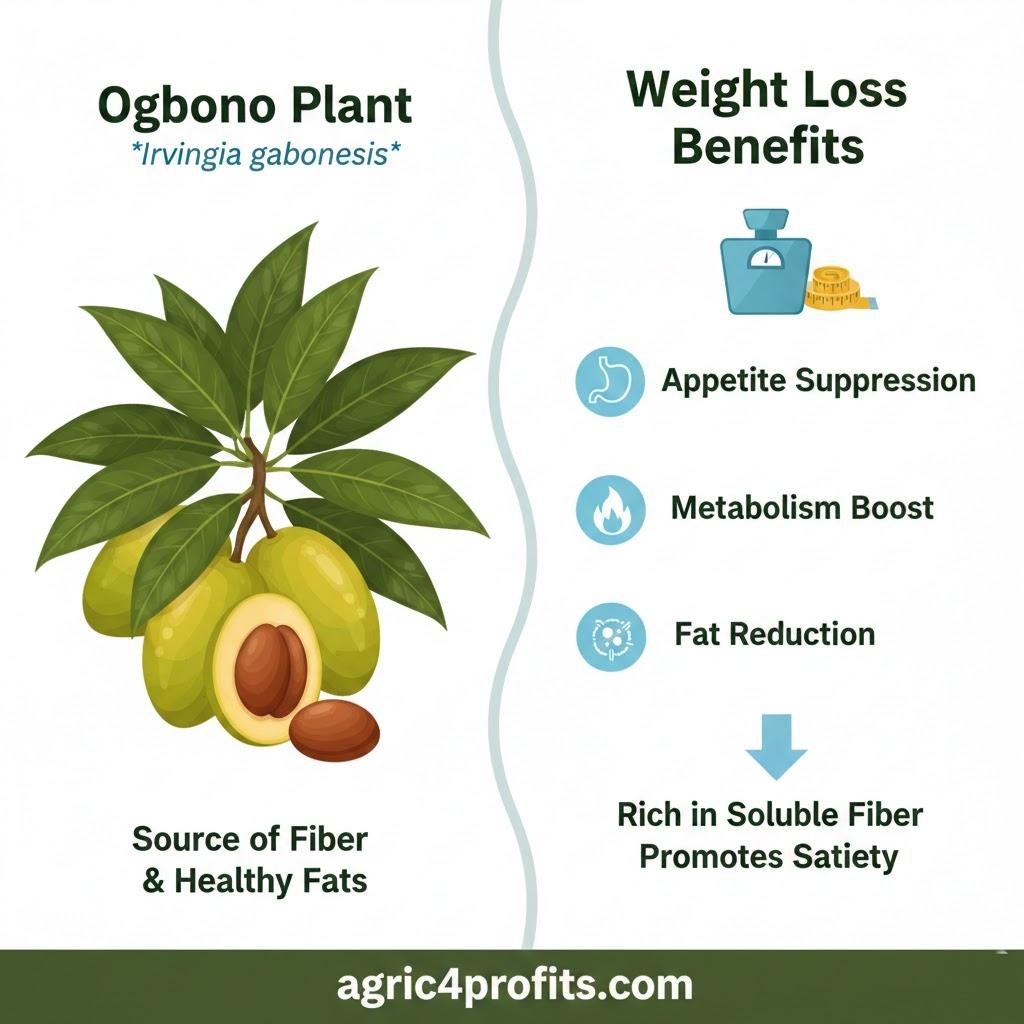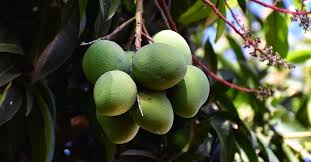Ogbono plant, scientifically known as Irvingia gabonensis, is a tropical tree native to West Africa. It is primarily known for its seeds, commonly referred to as ogbono seeds. These seeds are rich in dietary fiber, healthy fats, and essential nutrients, making them a popular ingredient in traditional African cuisine, especially in soups and stews. Beyond their culinary uses, ogbono seeds have gained attention for their potential health benefits, particularly in aiding weight loss.
The ogbono plant is renowned for its high fiber content, which plays a crucial role in promoting digestive health. Dietary fiber is essential for maintaining a healthy gut, as it helps regulate bowel movements and prevents constipation.
By incorporating ogbono seeds into one’s diet, individuals can enhance their digestive processes, leading to better nutrient absorption and overall gut health. This is particularly important for those looking to manage their weight, as a healthy digestive system is vital for effective weight loss.
Moreover, the ogbono plant has been linked to appetite control, which can be beneficial for weight loss efforts. The fiber in ogbono seeds expands in the stomach, creating a feeling of fullness that can help reduce overall calorie intake.
This natural appetite suppression can prevent overeating and snacking between meals, making it easier to adhere to a healthy eating plan. By incorporating ogbono into meals, individuals can enjoy satisfying dishes while managing their hunger levels.
In addition to its appetite-suppressing properties, the ogbono plant may also assist in regulating blood sugar levels. Some studies suggest that ogbono seeds can help lower blood sugar levels and improve insulin sensitivity, which is crucial for weight management.
When blood sugar levels remain stable, cravings for sugary and high-calorie foods are reduced, helping individuals make healthier food choices. This can be especially beneficial for those who struggle with cravings or who are at risk of developing diabetes.
The ogbono plant’s potential role in weight loss can also be attributed to its ability to promote healthy metabolism. The healthy fats present in ogbono seeds are known to support metabolic processes, aiding in the breakdown of fats and carbohydrates for energy. A well-functioning metabolism is essential for effective weight loss, as it helps the body burn calories more efficiently. Including ogbono in a balanced diet can contribute to an active metabolism, further enhancing weight loss efforts.
Furthermore, ogbono seeds are rich in antioxidants, which play a crucial role in combating oxidative stress and inflammation in the body. Chronic inflammation has been linked to weight gain and obesity, making antioxidants an important component of any weight loss strategy. By incorporating foods rich in antioxidants, such as those derived from the ogbono plant, individuals can support their body in maintaining a healthy weight.
Nutritional Profile of Ogbono Seeds

1. Healthy Fats: Ogbono seeds are rich in healthy fats, primarily monounsaturated and polyunsaturated fats, which are beneficial for heart health and can help lower bad cholesterol levels.
2. Protein Content: They provide a significant amount of protein, essential for muscle repair and growth, making Ogbono a valuable addition to the diet, especially for vegetarians and vegans.
3. Dietary Fiber: Ogbono seeds are an excellent source of dietary fiber, contributing to digestive health by promoting regular bowel movements and preventing constipation.
4. Vitamins: Ogbono seeds contain vitamins such as vitamin A, vitamin B complex (including B1, B2, and B3), and vitamin E, which play various roles in maintaining skin health, energy metabolism, and antioxidant protection.
5. Minerals: They are rich in essential minerals like magnesium, potassium, and calcium, supporting bone health, muscle function, and overall bodily functions.
How Ogbono Aids in Weight Loss
1. Low in Calories: Ogbono seeds are relatively low in calories compared to many other energy sources, making them a smart choice for those looking to lose weight without sacrificing nutrition.
2. Promotes Satiety: The high fiber content in Ogbono seeds increases feelings of fullness, helping to control appetite and reduce overall calorie intake throughout the day.
3. Blood Sugar Regulation: Ogbono seeds may help stabilize blood sugar levels, preventing spikes and crashes that can lead to cravings and overeating, which is beneficial for weight management.
4. Nutrient-Dense: Ogbono seeds provide a wealth of nutrients without excessive calories, ensuring that those on a weight loss journey receive essential vitamins and minerals necessary for health.
5. Versatile Use: Ogbono can be incorporated into various meals, including soups and stews, allowing for creative and satisfying dishes that support weight loss goals.
The Role of Fiber in Ogbono
1. Digestive Health: The dietary fiber in Ogbono seeds promotes healthy digestion by adding bulk to stool and facilitating regular bowel movements, reducing the risk of constipation.
2. Weight Management: Fiber helps with satiety, which can lead to reduced calorie consumption and support weight loss efforts by keeping individuals feeling full longer.
3. Blood Sugar Control: Fiber slows down the absorption of sugar into the bloodstream, helping to maintain steady blood sugar levels and reducing the risk of insulin spikes, which is especially beneficial for diabetics.
4. Heart Health: A high-fiber diet is associated with lower cholesterol levels, which can reduce the risk of heart disease and improve overall cardiovascular health.
5. Gut Health: Fiber acts as a prebiotic, feeding the beneficial bacteria in the gut, which can enhance gut health and contribute to a balanced microbiome, further supporting overall health and wellness.
Read Also: Rose Chafer: Description, Damages Caused, Control and Preventive Measures
Ogbono and Appetite Suppression

1. High Fiber Content: Ogbono seeds are rich in dietary fiber, which promotes feelings of fullness and satiety, reducing hunger pangs and the desire to snack between meals.
2. Gel-Like Consistency: When prepared, Ogbono forms a gel-like substance that adds volume to meals without adding excessive calories, helping to curb appetite effectively.
3. Slower Digestion: The fiber in Ogbono slows down digestion, prolonging the feeling of fullness and stabilizing blood sugar levels, which can help reduce cravings.
4. Nutrient Density: As a nutrient-dense food, Ogbono provides essential vitamins and minerals without high caloric content, supporting overall health while managing appetite.
5. Balances Blood Sugar: Ogbono can help regulate blood sugar levels, preventing spikes that lead to sudden hunger, thereby promoting better appetite control.
Metabolism Boosting Properties of Ogbono
1. Rich in Healthy Fats: Ogbono seeds contain healthy fats that can boost metabolic rate and promote fat oxidation, aiding in weight management.
2. Protein Source: The protein content in Ogbono helps build muscle, which can enhance metabolism, as muscle tissue burns more calories than fat tissue.
3. Nutrient Absorption: Ogbono’s nutrients support the body’s metabolic processes, ensuring efficient energy production and utilization, which can contribute to a healthier metabolism.
4. Promotes Thermogenesis: The healthy fats and proteins in Ogbono can promote thermogenesis, a process that generates heat and burns calories in the body.
5. Supports Thyroid Function: The presence of essential minerals in Ogbono, such as zinc and selenium, plays a crucial role in maintaining proper thyroid function, which regulates metabolism.
Incorporating Ogbono into Your Diet
1. Ogbono Soup: Prepare Ogbono soup by blending the seeds with water and cooking them with assorted meats and vegetables, making a hearty meal.
2. Thickening Agent: Use Ogbono as a thickening agent in stews and sauces to enhance texture while adding nutritional value.
3. Smoothies and Shakes: Add powdered Ogbono to smoothies or shakes for an extra nutrient boost and a satisfying texture.
4. Mixed with Grains: Incorporate Ogbono into dishes like porridge or rice by mixing it with your favorite grains, enhancing both flavor and nutrition.
5. Baked Goods: Experiment with adding Ogbono flour to baked goods like pancakes or bread for added health benefits and unique flavors.
Ogbono Recipes for Weight Loss
1. Ogbono Soup with Vegetables: Combine Ogbono powder with water, diced vegetables (like spinach, carrots, and bell peppers), and lean protein (like chicken or fish) for a nutritious, low-calorie soup.
2. Ogbono and Fish Stew: Sauté onions and tomatoes, then add Ogbono seeds to create a thick stew with grilled fish, providing a rich source of protein and healthy fats.
3. Ogbono Porridge: Mix Ogbono powder with water, sweeten with honey, and add fruits like bananas or berries for a fiber-rich breakfast option that keeps you full longer.
4. Ogbono Smoothie Bowl: Blend Ogbono with your choice of fruits, yogurt, and a splash of almond milk, then top with nuts and seeds for a delicious, nutritious snack.
5. Ogbono Pancakes: Use Ogbono flour to create pancakes, adding in oats and bananas for a filling breakfast that supports weight loss.
Read Also: Bedbugs: Description, Damages Caused, Control and Preventive Measures
Potential Side Effects of Ogbono

1. Digestive Issues: Due to the high fiber content, consuming large amounts of Ogbono may cause bloating, gas, or stomach discomfort in some people, especially if they’re not used to high-fiber foods.
2. Allergic Reactions: Some individuals may experience allergic reactions, though this is rare. Symptoms could include skin rashes, itching, or respiratory discomfort after consuming Ogbono.
3. Interference with Absorption: Ogbono’s thickening properties may slow down the absorption of certain medications or nutrients, which could be a concern for individuals on specific treatments.
4. Low-Calorie Diet Impact: Ogbono, when used as a meal replacement or eaten in large amounts, may result in insufficient calorie intake, especially for those with high energy needs, which could lead to fatigue or nutrient deficiency.
5. Choking Hazard (Unprepared Seeds): Swallowing unprocessed or dry Ogbono seeds can pose a choking risk, as they may expand when exposed to liquids in the body, particularly the esophagus.
Comparing Ogbono with Other Weight Loss Foods
1. Ogbono vs. Chia Seeds: Both Ogbono and chia seeds are rich in fiber, but Ogbono’s gel-like consistency when cooked provides more of a natural thickening agent for soups, whereas chia seeds are often used in smoothies or puddings.
2. Ogbono vs. Flaxseeds: While flaxseeds offer omega-3 fatty acids and similar fiber content, Ogbono is known for its use in traditional African meals, making it more versatile as a thickener and soup base for savory dishes.
3. Ogbono vs. Psyllium Husk: Both Ogbono and psyllium husk support digestion and satiety due to their high fiber, but Ogbono adds more flavor and nutritional diversity to meals, while psyllium husk is primarily used for its laxative properties.
4. Ogbono vs. Green Tea: Unlike green tea, which is known for boosting metabolism due to its antioxidants and caffeine, Ogbono works more as a filling agent in meals to reduce hunger and aid digestion without stimulating the nervous system.
5. Ogbono vs. Avocados: Ogbono and avocados both provide healthy fats, but Ogbono is more focused on its appetite-suppressing fiber content, while avocados offer a broader range of vitamins and minerals with a creamy texture.
Ogbono offers numerous benefits for weight management, primarily due to its high fiber content, which promotes satiety, reduces cravings, and supports healthy digestion. Its thickening properties make it versatile for use in soups, stews, and smoothies, adding volume to meals without excessive calories.
Additionally, its metabolism-boosting nutrients, such as healthy fats and proteins, can support sustained energy and fat burning. While Ogbono presents minor risks, such as potential digestive discomfort or allergies, these side effects are generally mild and manageable with proper portion control.
Compared to other weight loss foods like chia seeds or flaxseeds, Ogbono stands out for its unique culinary uses and nutritional profile, making it a valuable addition to any diet focused on weight management. Incorporating Ogbono into regular meals, experimenting with recipes, and balancing it with other healthy foods can offer a sustainable approach to achieving weight loss goals while enjoying the nutritional benefits it brings.
Scientific Evidence and Case Studies on Ogbono Plant and Weight Loss

1. Reduction in Body Weight: Studies have shown that regular consumption of Irvingia gabonensis seeds leads to significant decreases in body weight and waist circumference in overweight individuals.
2. Improved Lipid Profile: Ogbono supplementation has been linked to lower levels of total cholesterol, LDL cholesterol, and triglycerides while increasing HDL cholesterol.
3. Enhanced Fat Metabolism: Research indicates that ogbono seeds promote fat oxidation and reduce fat storage, contributing to better body composition.
4. Appetite and Satiety Improvement: Clinical trials demonstrate that ogbono increases feelings of fullness and reduces hunger, leading to lower daily calorie intake.
5. Blood Sugar Regulation: Evidence suggests ogbono helps stabilize blood glucose levels and improves insulin sensitivity, supporting weight management.
Summary of Ogbono Plant and Weight Loss
| Section | Key Points |
|---|---|
| Introduction | Ogbono (Irvingia gabonensis) is a West African tree; seeds are nutrient-rich and aid weight loss through fiber, fats, and nutrients. |
| Nutritional Profile | Rich in healthy fats, protein, dietary fiber, vitamins (A, B-complex, E), and minerals (magnesium, potassium, calcium). |
| How Ogbono Aids Weight Loss | Low-calorie, promotes satiety, regulates blood sugar, nutrient-dense, and versatile in meals. |
| Role of Fiber | Supports digestion, weight management, blood sugar control, heart health, and gut microbiome. |
| Appetite Suppression | High fiber creates fullness, gel-like texture, slower digestion, nutrient density, and stable blood sugar. |
| Metabolism Boosting | Healthy fats and protein enhance metabolic rate, thermogenesis, and thyroid function. |
| Incorporating into Diet | Use in soups, as thickener, in smoothies, with grains, or in baked goods. |
| Recipes for Weight Loss | Vegetable soup, fish stew, porridge, smoothie bowl, and pancakes with ogbono. |
| Potential Side Effects | Possible bloating, allergies, medication interference, low-calorie risks, choking hazard if unprepared. |
| Comparison with Other Foods | More versatile than chia, flaxseeds, psyllium; different mechanism from green tea or avocados. |
| Conclusion | Sustainable weight loss aid via satiety, metabolism support, and nutrition; mild risks with proper use. |
Frequently Asked Questions
1. What is ogbono and how does it help with weight loss?
Ogbono, from the Irvingia gabonensis tree, is high in fiber and healthy fats that promote fullness, regulate blood sugar, and boost metabolism, making it effective for reducing calorie intake and supporting fat burning.
2. Is ogbono safe to consume every day for weight loss?
Yes, ogbono is generally safe in moderate amounts as part of a balanced diet, but start gradually to avoid digestive discomfort from its high fiber content.
3. How much ogbono should I eat daily to lose weight?
A typical serving is 1–2 tablespoons of ogbono powder or seeds per meal (e.g., in soup), which provides benefits without excess calories.
4. Can ogbono be used in recipes other than soup?
Yes, add ogbono powder to smoothies, porridge, stews, pancakes, or baked goods for extra nutrition and satiety.
5. Does ogbono lower blood sugar levels?
Yes, the fiber in ogbono slows sugar absorption, helping stabilize blood sugar and reduce cravings, which is beneficial for weight management.
6. Are there any side effects of eating ogbono seeds?
Possible mild side effects include bloating, gas, or allergic reactions in rare cases; avoid swallowing dry seeds to prevent choking.
7. How does ogbono compare to chia seeds for weight loss?
Both are high in fiber, but ogbono offers a unique gel-like texture ideal for soups and traditional meals, while chia is better for puddings or drinks.
8. Can ogbono boost metabolism?
Yes, its healthy fats, protein, and minerals support thermogenesis, muscle maintenance, and thyroid function for a more efficient metabolism.
9. Is ogbono suitable for vegetarians and vegans?
Absolutely, ogbono is plant-based and provides excellent protein and nutrients, making it ideal for vegetarian or vegan weight loss diets.
10. Where can I buy authentic ogbono seeds?
Authentic ogbono seeds are widely available in African markets, online stores specializing in Nigerian ingredients, or health food shops.
Do you have any questions, suggestions, or contributions? If so, please feel free to use the comment box below to share your thoughts. We also encourage you to kindly share this information with others who might benefit from it. Since we can’t reach everyone at once, we truly appreciate your help in spreading the word. Thank you very much for your support and for sharing!
Disclaimer: This article is for educational and informational purposes only. The health benefits described are based on scientific research and traditional knowledge. They ayre not a substitute for professional medical advice, diagnosis, or treatment. Always consult a healthcare professional before using any herb or natural remedy for medical purposes.
Read Also: How to Graft an Avocado Tree to Produce Avocado Fruit

